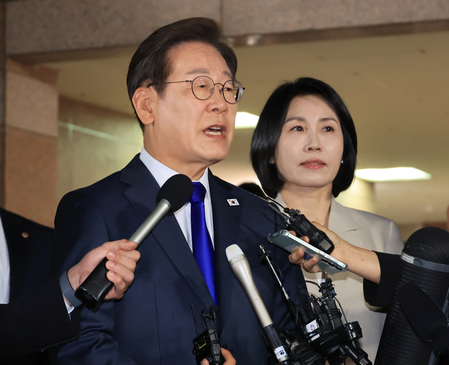
Seoul: Democratic Party (DP) candidate Lee Jae-myung has been elected President of South Korea following months of political upheaval triggered by the impeachment and removal of his predecessor over a failed attempt to impose martial law.
Lee’s victory marks a stunning political comeback after narrowly losing to former President Yoon Suk Yeol in the 2022 election by less than 1 percentage point. Yoon’s controversial move to impose martial law in December, which ultimately led to his ouster, created the conditions for Lee’s rise to power. However, it also deepened national divisions and intensified challenges from foreign policy issues like U.S. tariffs to North Korea’s growing nuclear threat.
According to Yonhap news agency, with all votes counted, Lee won 49.42% of the vote, defeating conservative People Power Party (PPP) candidate Kim Moon-soo, who secured 41.15%. Lee received over 17.3 million votes, surpassing Yoon’s previous record of 16.39 million votes from 2022 by a wide margin of 2.9 million.
Addressing a crowd in Yeouido, home to South Korea’s National Assembly, Lee vowed to uphold democracy and prevent any recurrence of military overreach. “We must overcome this insurrection and ensure that no military coup ever happens again,” he declared, with his wife Kim Hye-kyung standing by his side.
“As President, I will dedicate myself to reviving the economy and improving the livelihoods of our people,” Lee added.
Kim Moon-soo conceded defeat at a press conference, saying he “humbly accepts the people's decision” and congratulated Lee on his win. He also thanked the public for their continued resilience during the country’s recent crises.
The election was held exactly six months after Yoon shocked the nation by declaring martial law, an act that evoked painful memories of past military dictatorships and plunged South Korea into its deepest political and economic crisis in decades.
Lee’s campaign centered on pledges to defeat what he called the “insurrectionist forces” behind Yoon’s unconstitutional actions. Kim, on the other hand, focused on Lee’s legal controversies and leadership style, promising to prevent any “return to dictatorship.”
Exit polls predicted Lee’s victory by a margin of 12.4 percentage points, prompting celebrations among Democratic Party leaders and campaign staff. “The people have delivered a strong verdict against the insurrectionist regime,” said DP election chief Park Chan-dae on KBS.
PPP leaders were visibly disappointed. “We expected a closer race, maybe within the margin of error,” said Na Kyung-won, a co-chair of the PPP’s election committee. “The result has come as a shock.”
Out of 44.39 million eligible voters, about 35.24 million (or 79.4%) participated, the highest turnout since 1997. Over 34.74% of registered voters cast ballots early, the second-highest rate since early voting was introduced in 2014.
Vote counting began immediately after polls closed at 8 p.m. and concluded around 6 a.m. Wednesday. The National Election Commission (NEC) confirmed Lee’s win in a plenary session shortly thereafter.
As the election was a snap poll following Yoon’s removal, Lee assumed office immediately, without a transition period. His inauguration is expected to take place later today at the National Assembly.
In total, five candidates ran for president after two others dropped out mid-campaign. Alongside Lee and Kim, the other contenders were Lee Jun-seok of the New Reform Party, Kwon Young-guk of the Democratic Labor Party, and independent Song Jin-ho.
Pre-election surveys showed Lee consistently leading by around 10 percentage points, although the gap had narrowed slightly in the final days before polling blackouts took effect.
Both Lee and Kim emphasized economic growth, especially through investments in artificial intelligence. On national security, Lee promised pragmatic diplomacy amid shifting global dynamics, while Kim advocated for stronger deterrence against North Korea.
They also shared common ground on constitutional reform — proposing a shift from a single five-year presidential term to a two-term, four-year system. Kim even pledged to shorten his term to three years if elected, to align future presidential elections with parliamentary terms starting in 2028. Lee supported a referendum on constitutional changes, to be implemented from 2030.
While Lee and Kim voted early, other prominent figures, including former President Yoon and his wife, cast their ballots on Election Day. National Assembly Speaker Woo Won-shik also voted, expressing hope that the country would overcome its political crisis and advance toward a more democratic society.
With inputs from IANS